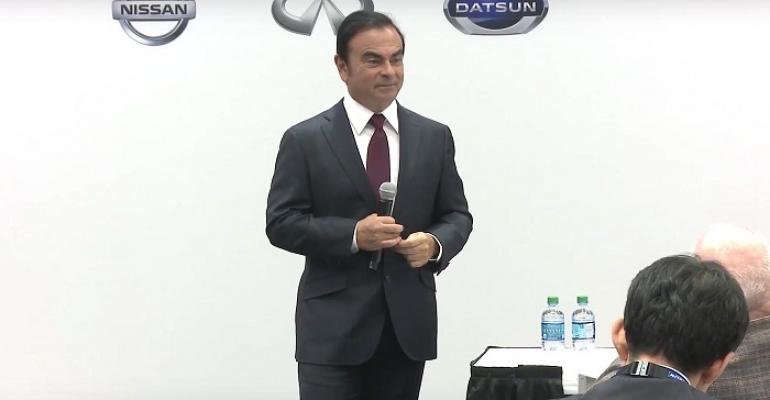NEW YORK – Nissan CEO Carlos Ghosn would be happy if Nissan hit its goal of 10% of the U.S. market in two to three years, he tells media here this morning at the kickoff breakfast for the 2016 New York International Auto Show.
That is a pullback from previously announced timing. Nissan had been aiming to achieve 10% share by the end of its next fiscal year in March 2017.
The Japanese automaker ended 2015 with 8.5% U.S. market share, up from 8.4% in 2014 but still significantly short of 10%, WardsAuto data shows.
However, market share for the first two months of 2016 rose to 9.6% from 9.3%, with the Nissan brand contributing a 0.4% increase to 8.8% and Infiniti up 0.1% to 0.5% share.
When Nissan does achieve 10% market share in the U.S., Ghosn says he wants it to be sustainable without discounts or other artificial measures.
Covering a variety of topics, Ghosn, who also serves as CEO of French automaker Renault, quashes enthusiasm for a much-rumored return of the Renault brand to the U.S.
“I don’t think it’s going to happen in the foreseeable future,” he says, but allows Renault could return to America farther down the road. Establishing Renault in emerging markets such as China is a bigger priority, Ghosn says.
He also calls the current downward trend for electric-vehicle sales temporary, noting global warming is increasing at a more rapid rate and the electrification of automobiles is one of industry’s only ways to reduce its emissions levels.
“There are several reasons to be bullish about EVs’ future,” Ghosn says, noting the relative simplicity of a motor and battery and fewer service visits compared with internal-combustion-engine vehicles.
EVs present the perfect platform for the autonomous and connected technology Nissan wants to bring to market, Ghosn says. Nissan and alliance partner Renault have a goal of retailing 10 models with autonomous-driving technologies by 2020.
However, he acknowledges the charging infrastructure still isn’t sufficient to make long-distance travel possible, a likely reason most car buyers have shunned EVs. The refueling infrastructure for hydrogen fuel-cell vehicles is an even bigger hill to climb, Ghosn offers.



